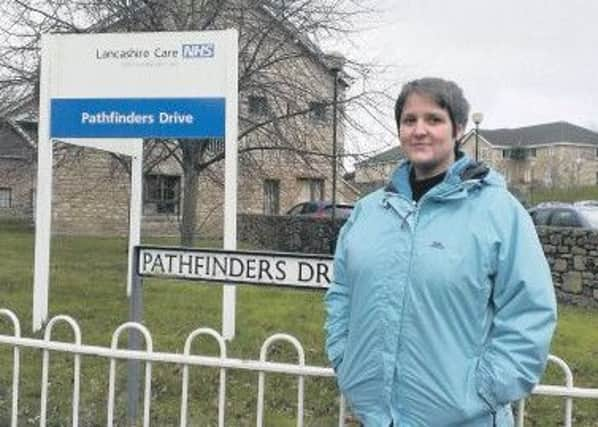Lancaster mum with 'fear of men' locked on hospital ward with transgender patient


Philippa Molloy, 42, said she was “genuinely, absolutely terrified” because she had suffered a relapse in her condition that made her irrationally terrified of men – including her own husband.
When she raised her concerns with hospital staff, however, she said she was not taken seriously and her medical notes implied that she was a “transphobic bigot”.
Advertisement
Hide AdAdvertisement
Hide AdShe said the NHS had failed to think through the implications of allowing patients to self-identify their gender.


“The rights of that trans person to feel safe were put above the rights of me to feel safe as a natal woman,” she said.
Mrs Molloy, who is married and has two children, was admitted to a women’s secure psychiatric ward in Burnley in February 2016, due to a bed shortage in Lancaster.
“Part of my psychosis was that I was convinced I was being followed by men’s rights activists,” she said. “It sounds ridiculous, but that was it.
Advertisement
Hide AdAdvertisement
Hide Ad“They wanted to kill me, they were going to come after me...and my husband was involved in everything.


“Because of that I was taken and placed in a female-only unit.”
She describes herself as a feminist who had previously campaigned against the closure of a women-only unit at The Orchard mental health unit in Lancaster.
She said: “If you erroneously believe that there are men wanting to infiltrate your life in order to kill you and that is on your notes and that is why you are in a female unit and you suddenly discover a male-bodied person in a six-bed bay...I was terrified. Genuinely. Absolutely.”
Advertisement
Hide AdAdvertisement
Hide AdMrs Molloy said the transgender patient, who had arrived four days into her stay, was “presenting as female but was very clearly physically male, very broad shoulders, and about 6ft.
“They used to wander around in their dressing gown, not a particularly long dressing gown, all the time,” she said.
“You are on a locked ward and you have nowhere to go – in Burnley there are no private rooms and you are just separated by curtains.”
She said other women on the ward were also at risk, one being a victim of male violence and another woman experiencing hypersexuality as a symptom of bi-polar mania.
Advertisement
Hide AdAdvertisement
Hide AdTwo days after the arrival of the trans patient, Mrs Molloy was moved to The Orchard in Lancaster, where she stayed until April.
While there, she said she was taken aback when a nurse handling her case told her she was “really surprised to read your opinion about trans people” in the case notes.
Mrs Molloy was shocked by the implication that she was a “transphobic bigot” and by the failure to recognise that her response in the secure ward was “because I was psychotic”.
“I don’t think trans people are a threat at all,” she said. “At the time I believed that men were a threat.
Advertisement
Hide AdAdvertisement
Hide Ad“When I am well I am totally willing to accept all people, but I was struggling with reality and what seemed to be real to me wasn’t reality.
“When I was able to see something real my reaction was that there was nothing to fear.
“I don’t blame the nurses who looked after me in Lancaster. My problem has never been with anybody in Lancaster. They are excellent nurses and they can’t help what was written in my notes by nurses in Burnley. The care in Lancaster was exemplary.”
Mrs Molloy said the incident made her scared of going to hospital last October when she had suffered a relapse.
Advertisement
Hide AdAdvertisement
Hide AdA spokesman for Lancashire Care NHS Foundation Trust said: “We would welcome the opportunity to discuss this directly with the person that has raised it to fully understand their perspective and respond to their concerns face to face further to the written response that they have previously received.
“We are happy to discuss with them any aspects that remain to be an issue for them. It would not be appropriate to get into the detail of this in an open public forum as this could potentially compromise their confidentiality and that of other individuals.
“The Equality Act is clear and offers guidance about the admission of transgender people to NHS wards and this is something that we have also taken legal advice on to inform clinical decision making. This directs that transgender people should be able to self-identify and receive treatment on the ward that is appropriate and in line with that self-identification.
“At Lancashire Care we are committed to treating everybody equally and to ensuring the safety, privacy and dignity of everyone who is in our care.
Advertisement
Hide AdAdvertisement
Hide Ad“This is managed on a case by case basis and in line with their individual needs. Risk assessments also form a routine part of all decisions made about any admission to take into consideration the personal and clinical needs of all patients in a ward environment so that any necessary adjustments or arrangements that need putting in place can be made.”
Mrs Molloy previously led a campaign for The Orchard to accept women after it had re-opened as a male-only unit.
The inpatient unit, in Pathfinders Drive, opened in August 2015 as mixed sex accommodation following a revamp of the former Oaklands Unit, but by October, Lancashire Care Foundation Trust had made it men-only due to a peak in demand for male beds.
Campaign group Beds in the Orchard claimed its return to mixed sex accommodation as a victory after it put pressure on the trust to provide local mental health beds for local women.
Mrs Molloy said she believed the trust breached the Equality Act in closing the Lancaster female beds.